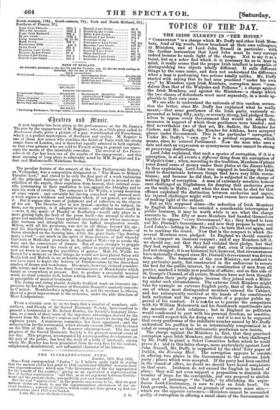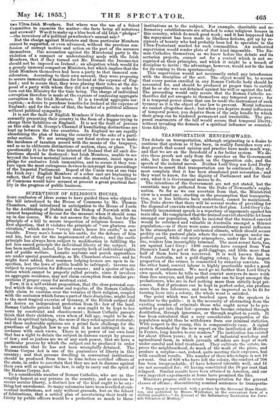TOPICS OF THE* DAY.
THE IRISH ELEMENT IN " THE HOUSE."
" CORRUPTION " is a charge which Mr. Duffy and other Irish Mem- hers fond of big words, throw broadcast at their own colleagues, at ifinisterst and at Lord John Russell in particular ; with the further insinuation that Lord John must be very corrupt indeed because he made light of the charge. Not to say it as a taunt, but as a sober fact which it is necessary r us to bear in mind, it really seems that the proper Irish intellect is incapable of distinguishing two objects totally different It calls different things by the same name, and does not understand the difference
when a man is performing two actions totally unlike. Mr. Duffy started with saying that he had seen practised " under his own eye," by Ministers upon Irish Members, corruption more " seat- dalous than that of the Walpoles and Pelhams "; a charge against the Irish Members, and against the Ministers—a charge which the two classes of defendants must meet separately, in a mode ap- plicable to their own cases. We are able to understand the rationale of this random accusa- tion the better, since Mr. Duffy has explained what he really meant,—that some gentlemen of the Irish party, variously re- presented as being fifty, sixty, or seventy strong, had pledged them- selves to oppose every Government that would not adopt the measures in support of which those gentlemen were banded ; and that nevertheless two of that set, Mr. Sadleir, the Member for Carlow, and Mr. Keogh, the Member for Athlone, have accepted places under Government. This is the particular" corruption." Under Mr. Duffy's "own eye" is a poetical expression, which means, since he entered Parliament. Now the man who uses a date and such an expression as synonymous terms cannot be strong at preserving distinctions. Lord John explained, that such a species of corruption, if it is a
corruption, is at all events a different thing from the corruption of Walpole's time ; when, according to the tradition, Members of pliant votes found sums of money under their plates at the dinner-table. In thus explaining, Lord John was engaged in teaching the Irish mind to discriminate between things that have very little resem- blance; and because he did that, he is subjected to the charge of making light of corruption. A man of extremely sensitive honour once challenged an Englishman for denying that anchovies grew on the walls in Malta ; and when the man whom he shot for that offence explained the distinction between anchovies and capers, his injured challenger might with equal reason have accused him of making light of the subject.
But as this supposed crime—the seduction of Irish Members
by English Ministers—has entailed a considerable interruption of public business, it may be worth while to see what the charge amounts to. The fifty or more Members had banded themselves together to oppose "every Government," &e. ; they helped to turn out Mr. Disraeli's Government ; and now they propose to turn out Lord John's—letting in Mr. Disraeli's—to turn that out again, and so to continue the round. Now that is the compact to which the several Members were pledged. In England we should consider such a compact an immoral compact ; and if any y Members left it, we should say, not that they had violated their pledge, but that they had repented. We should say that, even if circumstances had not changed ; it is an historical fact, however, that circumstances have materially changed since Mr. Disraeli's Government was driven from office. The formation of the new Ministry, not confined to any particular party, but constructed in the endeavour to secure the best for the public interest, by a combination of men from all parties, marked a totally new position of affairs ; and on this side of St. George's Channel, at all events, Members have not been thought to abandon their party pledges because they joined such a Minis- try under such circumstances. The extreme Irish Members might take for example an extreme English party, that of the Radicals, one of whose most distinguished members entered the Cabinet, and has subsequently received at the hands of his constituents both reelection and the express tribute of a popular public ap- proval of his conduct. It is nobler us to pursue the comparison with Sir William Molesworth and his Southwark constituents into the minntiie of Irish relations ; but in England no politician would condescend to part with his personal freedom, no constitu- ency would respect him for doing so ; and it is not to be supposed that every gentleman of the indefinite number named by Mr. Daffy understood his position to be so interminably compromised in a cabal or conspiracy as that enthusiastic gentleman now insists.
The charge against the Ministers is, first, that they practised
corruption upon Irish Members, and then shrunk when challenged by Mr. Duffy to grant a Select Committee before which he could prove it ; and in this latter charge, more particularly against Lord John Russell, Mr. Duffy is supported by the chief Tory paper of Dublin, the Evening Mail. The corruption appears to consist° in offering two places in the Government to the extreme Irish party ; places which were accepted. If the party had been omitted in the round of offers, no doubt we should have heard complaints on that score. Irishmen do not exceed the English in hatred of place ; they will not even support a proposition to diminish the number of traps for the corruptible, and any proposal to abolish that nest of patronage "the Castle," by abolishing the super- fluous Lord-Lieutenancy, is sure to raise an Irish howl. On Irish grounds, therefore, and on grounds of common sense also,— which are the opposite extremes,—Ministers cannot be accounted guilty of corruption in offering a small share of the Government to two Ultra-Irish -Men:filers. But where was the use of a Select Committee to examine the matter—the facts being all notorious and avowed ? Was itto make up a blue book of old Irish " pledges " —the inventory otia—political pawnbroker's annual sale ?
But the charge against Ministers and those particular Members cannot be supported, or even advanced, without the previous con- fession of corrupt motive and action on the part of the accusers themselves. One accusation against the Ministerial party is the violation of a compact or understanding made with the Irish Members, that if they turned out Mr. Disraeli the Income-tax should not be imposed on Ireland ; an allegation which would fix a grossly immoral compact on Ministers, but which implies that the Irish Members themselves had been a party to that immoral con- sideration. According to their own account, they were proposing to Bemire immunity of taxation for Ireland at the expense of Eng- land; and to secure that, they were placing their votes at the dis- posal of a party with whom they did not sympathize, in order to turn out the Ministry for the time being. The charge of individual corruption therefore is made at the expense of confessing aggregate corruption in the Irish Members. It is a twofold aggregate cor- ruption,—a desire to purchase benefits for Ireland at the expense of England; and for the sake of that, the barter of a political salience without political sympathy. It is not the fault of English Members if Irish Members are in- cessantly presenting their country in the form of a beggar trying to charge their liabilities on England. It is not the fault of persons on this side of St. George's Channel if humiliating distinctions are kept up between the two countries. In England we are rapidly abandoning the plan of taxing the country for the sake of a parti- cular section. We are arranging our fiscal system so as to make the incidence of taxation accord with the means of the taxpayer, and so as to obliterate distinctions of section, class, or place. Un- questionably it is for the true interest of Ireland that all such dis- tinctions should be destroyed : but Irish Members, unable to see beyond the lowest material interest of the moment, insist upon a pledge for exclusive Irish immunities, and to secure it they ven- ture upon the most outrageous devices to interrupt the proceedings of the Imperial Parliament. Repeal of the Union was at one time the Irish cry : English Members of a sober cast are beginning to reflect, that if that cry had been conceded, the relief to our House of Commons would have secured at present a great practical faci- lity in the progress of public business.



























 Previous page
Previous page